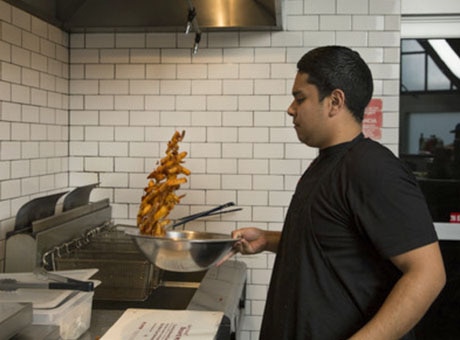When you own a restaurant, you typically need your head chef to be on site as often as possible. This individual helps create the menu, steers the direction of the business, and oversees the other cooks in the kitchen. As a result, you may want to pay your chef a salary to avoid overtime payments, but there’s specific labour laws you should understand before taking this route.

Paying Your Chef a Salary: An Overview of the Rules
Managers and Supervisors
If someone is in a managerial or supervisory role, you can pay a salary and not worry about overtime rates. If you opt to classify your chef in this way, you need to ensure he or she spends the majority of time doing managerial tasks. In particular, training, scheduling, and overseeing line cooks is considered supervisory, and tasks such as ordering new inventory and writing menus are managerial. If your head chef spends most of the time in the kitchen shaking pans, that labour is generally not considered managerial. If your chef does a mixture of managerial tasks and regular labour, the government recommends using the 50% rule. If 50% or more of the time is working in a nonmanagerial capacity, your chef is not a manager. As a result, you need to pay an hourly wage or a fixed salary, and you need to pay overtime any time your chef works more than 44 hours in a week.
Fixed Salary
A fixed salary functions like a salary, but it also includes overtime. To explain, imagine you agree to pay your chef a fixed salary of $1,000 per week in exchange for a 40-hour work week. With this arrangement, if the restaurant is slow and your chef works fewer hours, he or she can still count on getting a full paycheque. This helps your business attract top talent to stay competitive with other restaurants. If you offer a fixed salary and your chef works more than the hours outlined in the agreement, you have to pay for those hours based on an hourly rate. In this case, your chef earns $25 per hour. You must pay that rate on all hours up to 44 per week, and any hours over that must be compensated at time and a half.
Working Holidays
Canada requires employers to give their workers time off on certain holidays or pay workers extra for working those days. If your restaurant closes on holidays, you can simply pay your chef the regular daily rate. If your chef works on the holiday, you have two options:
- You can give your chef another day off during that week and pay the usual weekly salary.
- If your chef is going to work on the holiday and not take another day off, you need to pay the premium holiday rate. This rate is 1.5 times your employee’s regular hourly rate, and your employee gets this amount in addition to regular pay. In most cases, the holiday rate ends up being your chef’s hourly rate times 2.5, but that can vary based on how much your chef worked in the last four weeks.
As an employer, you have to remember and deal with lots of labour laws. With chefs, you can pay an overtime exempt salary, but they have to work in a managerial capacity for this to be possible. In all other cases, you need to pay your chefs hourly or fixed salaries, and calculate holiday pay accordingly.


